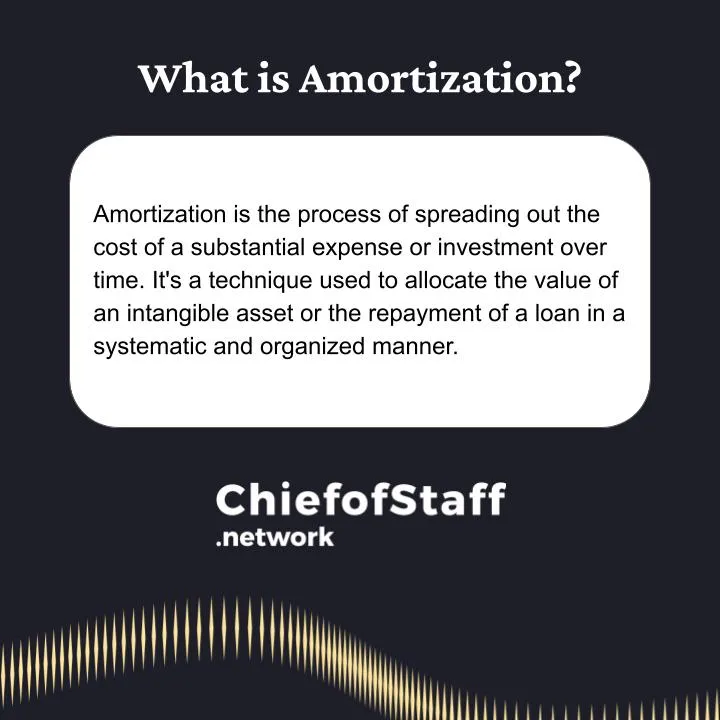1. What does Amortization mean?
Amortization is a financial term that often pops up in the realm of loans and investments. At its core, amortization is the process of spreading out the cost of a substantial expense or investment over time. It's a technique used to allocate the value of an intangible asset or the repayment of a loan in a systematic and organized manner.

In simpler terms, when you amortize, you are essentially breaking down a big financial commitment into smaller, manageable pieces spread across a specific period.
2. Why is Amortization important to businesses?
Amortization is a critical concept for businesses, particularly in managing finances and understanding the true cost of assets over time. Here's why it matters:
- Accurate Financial Reporting: Amortization helps businesses accurately reflect the cost of intangible assets, such as patents or copyrights, on their financial statements. This ensures transparency and compliance with accounting standards.
- Tax Benefits: Amortization of certain expenses and intangible assets can lead to tax benefits for businesses. It allows for the gradual recognition of costs, reducing taxable income over time.
- Budgeting and Planning: By amortizing major expenses or loans, businesses can plan their budgets more effectively. It provides a clear picture of the long-term financial impact, helping in strategic decision-making.
- Asset Valuation: Amortization is crucial for businesses to gauge the ongoing value of their assets. It reflects the realistic worth of assets as they are used over time.
- Investor Confidence: Investors and stakeholders often scrutinize a company's financial health. Understanding and correctly applying amortization principles enhance the credibility and reliability of financial reports, fostering investor confidence.
3. Who should care about Amortization?
Amortization isn't just for accountants; various stakeholders within and outside a business should pay attention:
- Finance Professionals: Accountants, financial analysts, and CFOs are directly involved in calculating and managing amortization. They ensure accurate financial reporting and compliance.
- Business Owners: Understanding amortization helps business owners make informed decisions about investments, loans, and asset management.
- Investors: Shareholders and potential investors analyze amortization practices to assess a company's financial health and its ability to manage long-term liabilities.
- Government Regulators: Regulatory bodies scrutinize amortization practices to ensure businesses adhere to accounting standards and tax regulations.
4. Risks associated with Amortization
While amortization is a useful financial tool, there are potential risks and challenges:
- Interest Rate Fluctuations: Changes in interest rates can affect the cost of amortizing loans, leading to higher or lower-than-expected expenses.
- Market Value vs. Book Value: Amortization may not always reflect the market value of assets, potentially causing discrepancies in financial reporting.
- Complex Accounting Rules: The intricacies of accounting standards related to amortization can pose challenges, especially for smaller businesses with limited resources.
- Over-Reliance on Estimates: Amortization often involves making estimates about an asset's useful life, and incorrect estimates can lead to financial mismanagement.
5. How is Amortization relevant to Chiefs of Staff?
Chiefs of Staff play a crucial role in executive management, and understanding amortization can aid them in various ways:
- Strategic Planning: Chiefs of Staff can contribute to strategic planning by providing insights into the long-term financial implications of major decisions, considering amortization.
- Resource Allocation: Amortization knowledge helps Chiefs of Staff in efficient resource allocation, ensuring that budgets align with the organization's long-term goals.
- Communicating with Stakeholders: Chiefs of Staff need to communicate effectively with various stakeholders. Understanding amortization allows them to explain financial decisions and outcomes clearly.
- Risk Management: Chiefs of Staff can contribute to risk management by identifying potential challenges associated with amortization and developing mitigation strategies.
6. Online resources to learn more about Amortization
For those eager to delve deeper into the world of amortization, here are some insightful online resources:
- Investopedia - Amortization
- AccountingTools - Amortization
- The Balance - Understanding Amortization
- Corporate Finance Institute - Amortization
- Khan Academy - Amortization
In conclusion, as businesses strive for financial resilience and success, embracing and mastering the principles of amortization becomes not just an option but a strategic necessity in navigating the complex waters of finance.









.webp)
